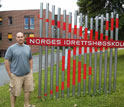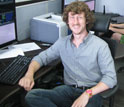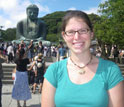News Release 13-120
NSF Announces First Cohort of Graduate Research Opportunities Worldwide Program
International research-and-education experiences in science, technology, engineering, and mathematics hold promise for students seeking to advance science globally

GROW student Anna Normand researches the impact of climate change on peatland vegetation in Sweden.
July 3, 2013
This material is available primarily for archival purposes. Telephone numbers or other contact information may be out of date; please see current contact information at media contacts.
Fifty-three graduate students working in disparate fields of science and engineering will soon begin international research experiences through the Graduate Research Opportunities Worldwide (GROW), a competitively awarded research and education program available to National Science Foundation (NSF) Graduate Research Fellows (GRFs).
Through GROW, NSF is collaborating with sister agencies in 12 countries to connect NSF GRFs to strategically selected educational and research institutions abroad.
As part of a competitive process, the students submitted proposals by which their candidacy for participation in GROW would be determined through a rigorous merit-review process. A science agency in a partner country will host the students for a period of three to 12 months. While overseas, they will receive a living allowance from the host country as they pursue their research at a host institution. They are also eligible to receive an international travel allowance from NSF.
Some of the 53 students have already begun their travels to their host countries. Each of the students will be studying in one of the following countries: Denmark, Finland, France, Japan, South Korea, Norway and Sweden. Their fields of study range from astronomy and physics to engineering, geosciences and mathematical sciences, and social and behavioral sciences. (See list below.)
"This opportunity to collaborate with others who may have different perspectives and processes enriches the graduate education of the students participating in GROW," said NSF Assistant Director Joan Ferrini-Mundy, who leads NSF's Education and Human Resources directorate. "GROW also supports NSF's broader commitment to address the internationalization of science and engineering and to provide multiple pathways to engagement with top researchers worldwide."
The 53 students taking part in GROW have been asked to share their experiences via social media. They will be posting pictures and commentary to the NSF Facebook page and Tweeting using the hashtag #NSF_GROW.
A list of this inaugural class of GROW students, their home institutions and their fields of study follow:
Denmark
Physics and Astronomy
Jerome Mlack, Johns Hopkins University
Finland
Engineering
Megan Leitch, Carnegie-Mellon University
Life Sciences
Yun Tao, University of California-Davis
Kim Reuter, Temple University
France
Computer/Information Science/Engineering
Robert Woodward, University of Nebraska-Lincoln
Engineering
Whitney Lohmeyer, Massachusetts Institute of Technology
Stephanie Lindsey, Cornell University
Andrew Mock, University of Illinois at Urbana-Champaign
Abigail Licht, Tufts University
Marc Perez, Columbia University
Ashley Thomson, Duke University
Whitney Coyle, Pennsylvania State University-University Park
Life Sciences
Alexandria Pivovaroff, University of California-Riverside
Hannah Marx, University of Idaho
Timothy Dunn, Harvard University
Mathematical Sciences
Andrei Tarfulea, Princeton University
Benjamin Fogelson, University of California-Davis
Social Sciences
Stefani Crabtree, Washington State University
Michael Barany, Princeton University
Jeremy Kuhn, New York University
Japan
Computer/Information Science/Engineering
Richard Veale, Indiana University
Engineering
Evgueni Filipov, University of Illinois at Urbana-Champaign
Geosciences
Debra Hausladen, Stanford University
Brent Delbridge, University of California-Berkeley
Life Sciences
Nicholas DiRienzo, University of California-Davis
Carolyn Keogh, University of Georgia
Psychology
Kathryn Jankowski, University of Oregon-Eugene
Social Sciences
Emily Sekine, New School University
South Korea
Physics and Astronomy
Calen Henderson, Ohio State University
Norway
Engineering
Erich Petushek, Michigan Technological University
Life Sciences
Hannah Kinmonth-Schultz, University of Washington
John Guittar, University of Michigan-Ann Arbor
Sean Maguire, University of Texas at Austin
Mathematical Sciences
Susan Wei, University of North Carolina at Chapel Hill
Psychology
Nicholas Grebe, University of New Mexico
Ryan Watson, University of Arizona
Elizabeth Canning, University of Wisconsin-Madison
Catharine Fairbairn, University of Pittsburgh
Sweden
Chemistry
Daniel Goldman, University of California-Berkeley
Ryan O'Donnell, Johns Hopkins University
Nardine Abadeer, University of Illinois at Urbana-Champaign
Mehrnoosh Arrar, University of California-San Diego
Engineering
Charles Shields, Duke University
Ryan Ziels, University of Washington
Scott Himmelberger, Stanford University
Geosciences
Anna Normand, University of Florida
Carl Hoiland, Stanford University
Life Sciences
John Casey, University of Hawaii
Samuel Georgian, Temple University
Aline Waguespack Claytor, Duke University
Elliot Aguilar, CUNY Graduate School University Center
Johnathon Anderson, University of California-Davis
Jennifer Lachowiec, University of Washington
-NSF-
-
GROW student Erich Petushek will conduct research with the Norwegian School of Sports Sciences.
Credit and Larger Version -
GROW student Calen Henderson (foreground) is in S. Korea analyzing data in search of exoplanets.
Credit and Larger Version -
GROW student Carolyn Keogh will research invasive marine invertebrates in Japan.
Credit and Larger Version -
View Video
GROW: A new international research opportunity for Graduate Research Fellows.
Credit and Larger Version
Media Contacts
Bobbie Mixon, NSF, (703) 292-8070, email: bmixon@nsf.gov
Maria C. Zacharias, NSF, (703) 292-8454, email: mzachari@nsf.gov
The U.S. National Science Foundation propels the nation forward by advancing fundamental research in all fields of science and engineering. NSF supports research and people by providing facilities, instruments and funding to support their ingenuity and sustain the U.S. as a global leader in research and innovation. With a fiscal year 2023 budget of $9.5 billion, NSF funds reach all 50 states through grants to nearly 2,000 colleges, universities and institutions. Each year, NSF receives more than 40,000 competitive proposals and makes about 11,000 new awards. Those awards include support for cooperative research with industry, Arctic and Antarctic research and operations, and U.S. participation in international scientific efforts.
Connect with us online
NSF website: nsf.gov
NSF News: nsf.gov/news
For News Media: nsf.gov/news/newsroom
Statistics: nsf.gov/statistics/
Awards database: nsf.gov/awardsearch/
Follow us on social
Twitter: twitter.com/NSF
Facebook: facebook.com/US.NSF
Instagram: instagram.com/nsfgov




